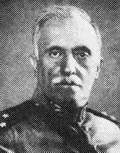João de Deus Mena Barreto descended from a family that had had fifteen generals in three generations. The son of General José Luís Mena Barreto, he began his military career in 1890, when entered a military school at Rio Pardo, Rio Grande do Sul. He defended the government of Floriano Peixoto during a federalist revolution in Rio Grande do Sul and later entered the Military Academy in Rio de Janeiro (1898). Promoted to lieutenant in 1900, Mena Barreto fought in the war with Bolivia over Acre in 1904 and participated in suppressing insurrections against federal government. He briefly served as assistant to his uncle, Antônio Adolfo da Fontoura Mena Barreto, who was war minister in 1911-1912. Mena Barreto alternated among command, staff, administration, and teaching until he was promoted to brigadier general in September 1921. In 1922, Mena Barreto commanded an infantry brigade sent to suppress the revolt at the Fort of Copacabana. He was promoted to general of division (December 1924), named commander of the First Military Region (1924-1926) and later served as inspector of a group of Military Regions. In 1926 Mena Barreto was elected to the influential post of president of the Military Club, a position previously held by Manuel Deodoro da Fonseca (1887-1889) and Hermes Rodrigues da Fonseca (1921-1922). Mena Barreto played a decisive role in the military coup and arrest of President Washington Luís Pereira de Sousa (24 Oct 1930) and joined the Junta of Government. When Getúlio Dorneles Vargas headed the provisional government, he returned to his job as inspector of a group of Military Regions. He briefly served as interventor (provisional governor) of the State of Rio de Janeiro (1931) and was named a minister of the Supreme Military Tribunal (1931-1933).Biography source: [1] [2] |

